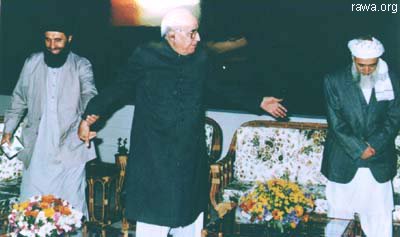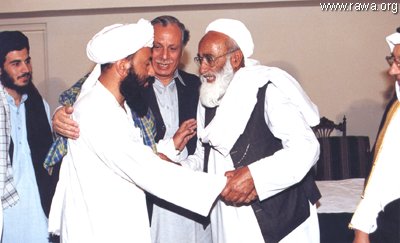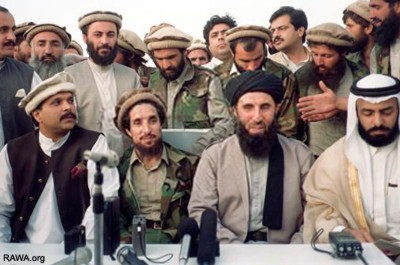San Francisco Chronicle, January 2, 2008
Every Ruler of Pakistan Supported Increasingly Islamic Fanaticism in Afghanistan
As reported in Steve Coll's authoritative book "Ghost Wars," Benazir Bhutto in a White House meeting with President Bill Clinton in the spring of 1995 "promoted the Taliban as a pro-Pakistan force that could help stabilize Afghanistan..."
Robert Scheer, Creators Syndicate, Inc.
In the film "Charlie Wilson's War," the nitwit and deeply corrupt congressman elevated to heroic status through Tom Hanks' ever-charming performance has a meeting with Pakistan's then-dictator Zia ul-Haq, in which they broker a deal for a joint effort to "save" Afghanistan from the Soviets. It's all great fun; the United States is, as always, on the side of the good guys, in this case the Afghan mujahedeen, who later morphed into the Taliban, hosts of al Qaeda.
 ( http://www.rawa.org/darkdays/darkdays36.htm )
( http://www.rawa.org/darkdays/darkdays36.htm )March 1993 - Islamabad: Gulbuddin Hekmatyar and Burhanuddin Rabbani, two criminal Afghan fundamentalists with their God-father Ghulam Ishaq Khan, former President of Pakistan.
 ( http://www.rawa.org/darkdays/darkdays58.htm )
( http://www.rawa.org/darkdays/darkdays58.htm )April 26, 1998 - Islamabad: Foreign Minister of Pakistan, Gauhar Ayub Khan, plays the conciliator as he brings delegation leader of the Taliban Wakil Ahmad Mutawakil (L) and Northern Alliance leader Fazal Hadi Shinwari (R).
 ( http://www.rawa.org/darkdays/darkdays64.htm )
( http://www.rawa.org/darkdays/darkdays64.htm )May 25, 1992: Ahmad Shah Massoud (2nd from left) signing agreement with Gulbuddin Hekmatyar, the most wanted criminal in Afghanistan, in presence of their Pakistani and Arab masters.
The movie does not mention that the mujahedeen went to war against the Soviet-backed government then in power in Kabul after it committed the unpardonable crime of allowing female students to attend rural schools. The film casually notes that General Zia, the U.S. ally in this effort to bring "freedom" to Afghanistan, was, like so many of the movie's heroes, a hard case full of contradictions, as exemplified by his having murdered Pakistan's previous ruler, Zulfikar Ali Bhutto.
Bhutto was, of course, the father of Benazir Bhutto, killed last week in Pakistan. What is not noted is that not only Zia, but every ruler of Pakistan since him, including Benazir Bhutto, supported increasingly virulent forms of Islamic fanaticism in Afghanistan, ending with the Taliban and the al Qaeda terrorists who attacked America on 9/11, and that all rulers of Pakistan enthusiastically amplified the successful effort initiated by Benazir's now mythically beloved father to build an Islamic nuclear bomb.
I bring this up now at a time when the mass media is all too enthusiastically celebrating Benazir Bhutto as the carrier of the democratic ideal and apologizing for her willing control over the party that she ruled as "chairman for life" to her arranged-marriage husband, Asif Ali Zardari, and their 19-year old son, Bilawal. Prior to his attending Oxford, he spent his formative years in the United Arab Emirates which, along with Saudi Arabia and Pakistan, were the only three countries to diplomatically recognize the Taliban.
Bilawal Bhutto Zardari doesn't seem familiar with the language used in Pakistan or much else about daily life in the country, but his father, known as "Mr. Ten Percent" for skimming wildly in previous Bhutto governments, assures us that a few more years at Oxford is all the seasoning this future hereditary democratic leader needs. It is hoped that the curriculum will include some reference to Pakistan's key role, abetted by American visionaries like Charlie Wilson, in spawning the current terrorism menace.
While the war on terror is used as the justification for U.S. meddling in Pakistan's politics and wasting at least $10 billion in funding to prop up the Musharraf government, it is rarely noticed that the general-turned-dictator and his key opponents are all more or less equally compromised by past support of the Taliban.
Nawaz Sharif, the religious-based opposition leader, is clearly the most sympathetic to the fundamentalists, as are his Saudi backers, who bear the most responsibility for funding Islamic extremism. But the "democratic alternative" of Bhutto, whom the United States sought to broker back into power, was as compromised on this issue of support for the Taliban as she was on the matter of the Islamic bomb.
Indeed Benazir Bhutto, in her second term as Pakistan's prime minister, oversaw funding of the Taliban and concealed that fact from the United States. As reported in Steve Coll's authoritative book "Ghost Wars," Benazir Bhutto in a White House meeting with President Bill Clinton in the spring of 1995 "promoted the Taliban as a pro-Pakistan force that could help stabilize Afghanistan ... During her visit and for many months afterward, Bhutto and her aides repeatedly lied to American government officials and members of Congress about the extent of Pakistani military and financial aid to the Taliban."
No doubt Benazir Bhutto had her virtues. Like many other reporters, I was mightily impressed with her intelligence upon meeting her. I never bothered to look too closely into the murders of her two brothers or the corruption changes that swirled around her and her husband. Nor did I focus on the disparity between the enormous wealth of the Bhutto clan and the miserable poverty of most they claimed to lead with their populist politics.
But I am not a Pakistani voter, and neither are those geniuses in the U.S. government who talked her into returning home without planning for the consequences. So, what else is new? But there is something: This time, the subject of our nation-building fantasy does have weapons of mass destruction and, thanks to our previous military sales of advanced jets, the means to deliver them. This time the blowback price of our incessant meddling could prove quite high. Even Tom Hanks can't put a pretty face on that one.
Characters Count: 6508
